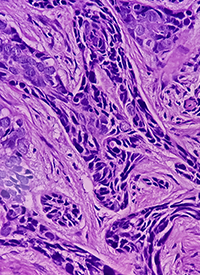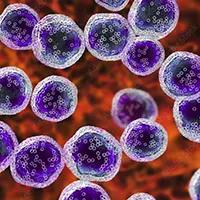News
Article
Tunlametinib Wins Approval in China for NRAS+ Advanced Melanoma After PD-1/PD-L1 Therapy
Author(s):
Key Takeaways
- Tunlametinib is the first targeted therapy approved in China for patients with NRAS-mutated melanoma.
- The phase 2 trial showed a median progression-free survival of 4.2 months and a median overall survival of 13.7 months.

China’s National Medical Products Administration (NMPA) has approved tunlametinib (HL-085) for the treatment of patients with advanced melanoma harboring NRAS mutations who were previously treated with anti–PD-1/PD-L1 therapy.1
The approval was supported by data from a single-arm phase 2 trial (NCT05217303), which demonstrated that evaluable patients with NRAS-mutated disease treated with the MEK inhibitor (n = 95) experienced an independent radiological review committee (IRRC)–assessed objective response rate (ORR) of 35.8% per RECIST v1.1 criteria. Furthermore, the disease control rate (DCR) was 72.6%, and the median duration of response (DOR) was 6.1 months. Tunlametinib elicited a median progression-free survival (PFS) of 4.2 months and a median overall survival (OS) of 13.7 months.2
Tunlametinib represents the first targeted therapy approved in China for patients with NRAS-mutated melanoma, according to the agent’s developer, KeChow Pharma.1
“We are excited and proud of this major milestone for KeChow. Tunlametinib, approved in China, is the first internally designed and developed molecule by [the] KeChow team,” Hongqi Tian, PhD, founder, chief executive officer, and chairman of KeChow Pharma, stated in a news release.1 “The approval of tunlametinib is an important milestone to provide [a] new treatment option for Chinese patients with NRAS-mutated advanced melanoma who previously received PD-1/PD-L1 [therapy]. We would like to express our sincere gratitude to the clinicians and patients who participated in our trials, and we thank the health authorities for their strong support. We are committed to making tunlametinib available in China as soon as possible to serve this patient population.”
The phase 2, open-label, multicenter trial enrolled patients at least 18 years of age with histologically or cytologically confirmed, unresectable stage III or IV melanoma. Patients were required to have a documented NRAS mutation at baseline; at least 1 target lesion per RECIST v1.1 criteria; an ECOG performance status of 0 or 1; and a life expectancy of more than 3 months. Prior treatment with chemotherapy, immunotherapy, or radiotherapy must have been completed at least 4 weeks prior to first study treatment, and all related adverse effects (AEs) must have been resolved to grade 1 or less, or to baseline, prior to treatment. No major surgery or major trauma was allowed within 14 days prior to study treatment.3
Other key exclusion criteria included active central nervous system lesions; a QT interval of 480 msec or higher, or a history of congenital long QT syndrome; and uncontrolled concomitant diseases or infectious diseases.
Enrolled patients received 12 mg of oral tunlametinib twice per day during 21-day treatment cycles.
ORR by IRRC assessment per RECIST v1.1 criteria served as the trial’s primary end point. Secondary end points included PFS, DCR, DOR, OS, and safety.2
Investigators enrolled 100 patients, who all received at least 1 dose of tunlametinib and were included in the safety analysis set. Notably, 95 patients harbored NRAS mutations, which were confirmed by a central laboratory, and these patients comprised the full analysis set (FAS). In the FAS, NRAS mutations included Q61 (78.9%), G12 (15.8%) and G13 (5.3%).
A subgroup analysis showed that patients who received prior immunotherapy experienced an ORR of 40.6%.
Regarding safety, the most common treatment-related skin AEs included rash (53%) and dermatitis acneiform (24%). The most common grade 3 or higher treatment-related AE was increased blood creatine phosphokinase (38.0%), which was mostly asymptomatic and manageable with dose modification.1
References
- KeChow Pharma announces NMPA approval of tunlametinib (HL-085) as the first targeted therapy for patients with NRAS mutated advanced melanoma and previously treated with PD-1/PD-L1. News release. KeChow Pharma. March 18, 2024. Accessed March 18, 2024. https://www.biospace.com/article/releases/kechow-pharma-announces-nmpa-approval-of-tunlametinib
- Wei X, Zou Z, Zhang W, et al. A phase II study of efficacy and safety of the MEK inhibitor tunlametinib in patients with advanced NRAS-mutant melanoma. Eur J Cancer. Published online March 11, 2024. doi:10.1016/j.ejca.2024.114008
- HL-085 in NRAS-mutated advanced melanoma. ClinicalTrials.gov. Updated May 31, 2023. Accessed March 18, 2024. https://www.clinicaltrials.gov/study/NCT05217303









